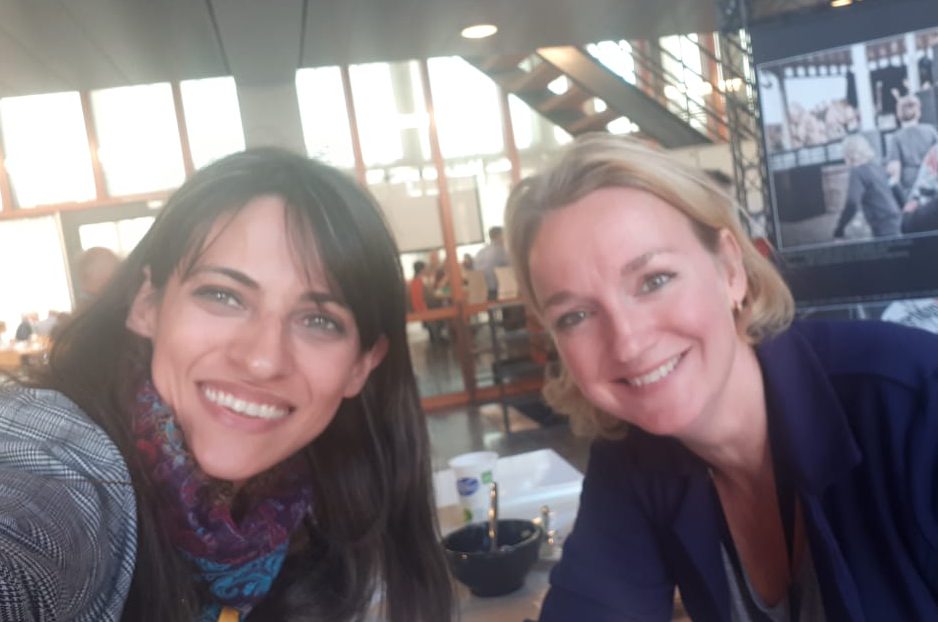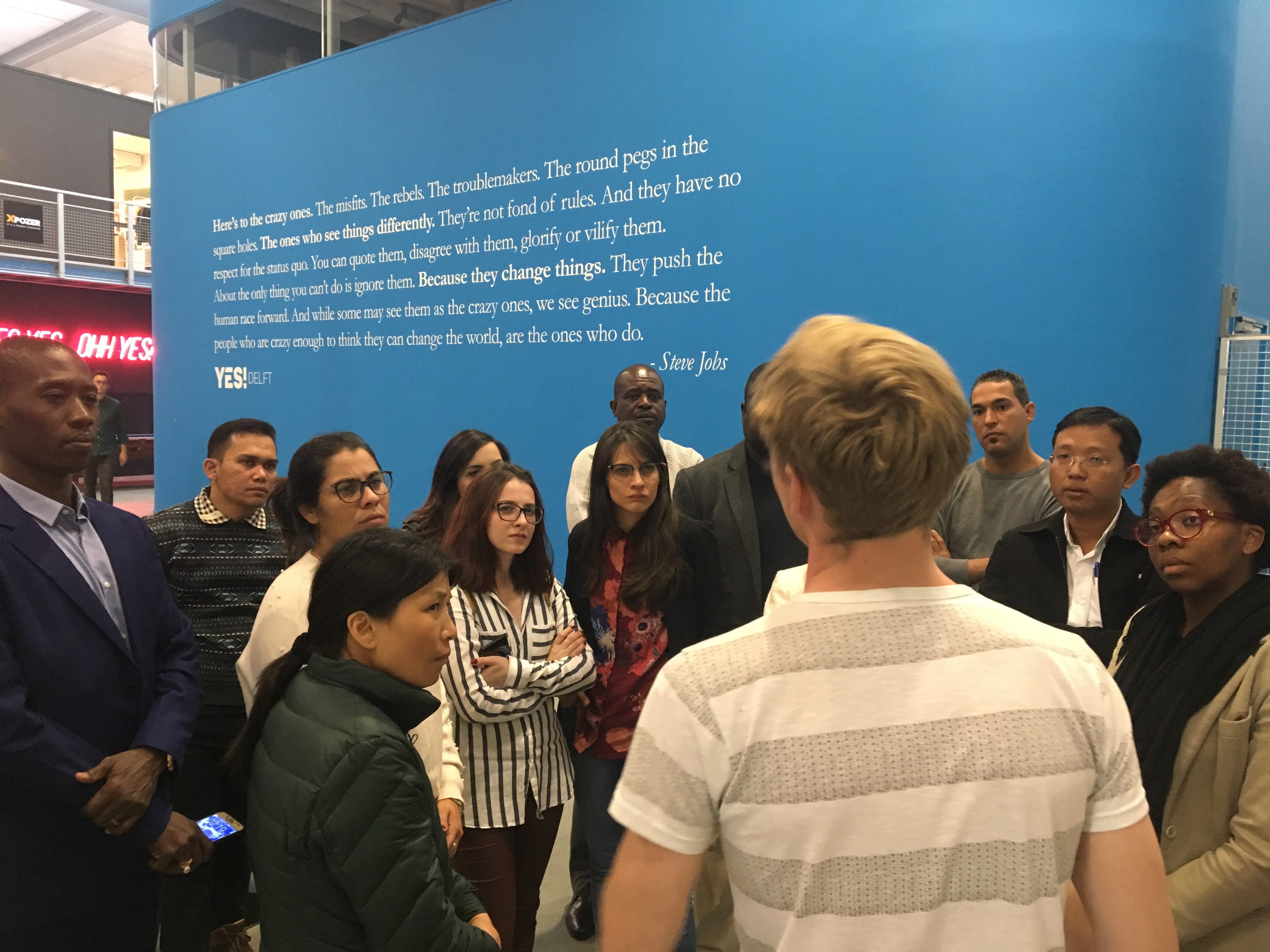The Hague Academy’s Talent for Governance (TfG) programme offers scholarship opportunities for young, ambitious civil servants who strive to improve services and boost economic development in their local communities. In addition to a scholarship to attend an Academy training, the programme includes an internship at a Dutch municipality. In this year’s Local Economic Development training our Talent, who will do an internship at the Municipality of Apeldoorn, shared details about her experience and the work that drives her.

Valentina Salomé Fortunato (left) with an official from the Municipality of Apeldoorn.
Who are you and what do you do?
My name is Valentina Maria Salomé Fortunato, but people usually just call me Salomé. I am 31 and I have worked for the municipality of Corrientes in Argentina since 2015 as a Secretary of Economic Development. Initially, my work was very difficult because the business environment was not developed. In the beginning, my team started in a very little apartment with only three people. Our function was to create a strategy for associative groups in the social economy.
When I talk about the social economy, I try to explain that when you have different sectors, you have more developed people and companies inside them. Take the textile industry, for example, you can find very large companies there, but also entrepreneurs with very modest resources. Our function is to help those entrepreneurs and create a strategy for this. One of these was to create business incubators for them. And we discovered this gave good results.
Something interesting happened because the people that participated in the incubators started to know each other and they wanted to have an association. Because, when you don’t have resources, it’s much better to work together. That makes your project more sustainable. That is my most important job in the municipality, to try to create incubators for different sectors.
Because these incubators are the way that I give them the skills to manage their entrepreneurship. They analyze their business plans, their goals, they study how to organize their production and formalization, how they need to do to pay taxes. After that, we always try to continue working with the entrepreneurs, because we are never finished with them.
What goal do you hope to achieve through your work in Argentina?
 My main goal is to help the people ascend economically and socially. I want to help lift people from the informal economy to become a formal entrepreneur.
My main goal is to help the people ascend economically and socially. I want to help lift people from the informal economy to become a formal entrepreneur.
In one example, an incubator for brick producers, I started with very poor people in a very informal situation and after three or four months they already needed to pay a higher tax level. Because they grew so fast! It gave the people really a different quality of life.
If you can pay taxes, you are going to have access to many different benefits. And after one year, the entrepreneurs had very good companies, especially if you compare it to when they started in the program. They are much better off when they are in the formal economy. My goal is really to help people to ascend socially. That is my mission as a civil servant.
What are the three main lessons you learned from this Local Economic Development course?
Well, the first real shock for me was when they told us it’s not only about the economic aspect of LED. You have to involve all of the aspects that are relevant. To really have local economic development in your society, you also have to focus on different aspects.
The second lesson was the sharing of experiences and contexts with the other participants because in Argentina we have a different societal and economic context. Sharing and listening to the problems of my classmates was really an eye-opener. It offered new perspectives on the issues others deal with in their communities and encouraged us to exchange ideas on solving social problems.
And the third lesson highlighted the importance of combining an LED project with social development. For me, the social aspect was the most important thing here, to try to involve that in the LED strategy.
“My goal is really to help people to ascend socially. That is my mission as a civil servant.”
What do you expect to learn from the Talent for Governance program and your internship at the municipality of Apeldoorn?
New practices, new ways to analyze and attack problems. I also expect to learn about new processes, good practices and different types of organisations. I would like to know how their different departments are organized. How does the organization work together? Do they have the typical authority functions or are they more informal? Do they have a circular organization chart or are they more traditional?
I studied Human Resource Management, so I put a lot of attention on how organizations are organized. As a result, I would like to learn about their organization structure could improve my own organization’s structure.
What do you think you can offer the municipality of Apeldoorn during your internship?
We do have different experiences and a different style of life, so I think that maybe the way I work and organize my job and develop my strategies can add something to their organization. For example, I always build my own instrument to collect new data and analyze it. I think I am good at that.

LED course participants make a site visit to TU Delft.
Additionally, I make an effort to make field visits because working in your office with your computer is fine, but you really have to visit the field and talk to the people making changes on the ground, the neighborhood leaders and entrepreneurs and local citizens
This is important even when you are alone! It’s not an excuse when you don’t have a large organization. Because when I started, we were only with two people. Maybe I can show them that you can always do that.
How did you come across TfG?
It was a coincidence, I think. The Hague Academy is very famous around the world. In my case, I found the Talent program by coincidence. I was looking to apply for a scholarship in Europe, and looking at scholarships.com when I found it. I did not know that the program existed. I was looking for information the program appeared in the search. But I immediately thought: “This is perfect for me!”
And when I found the Local Economic Development course I thought “This is what I do every day!” So I applied and I prepared my little project. It was a challenge because this is the first time I needed to prepare a strategy with only 2,000 characters. That is not easy, because you need to propose a solution to a real problem. That is the most important challenge to apply for the Talent program.
Related courses
We offer a diversity of courses throughout the year. Here are several other courses you might like.

